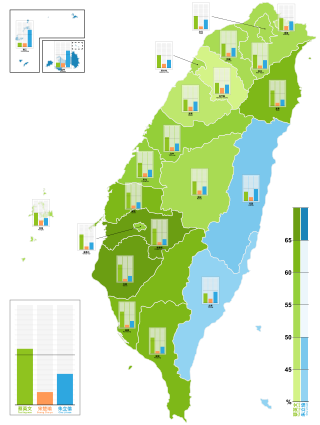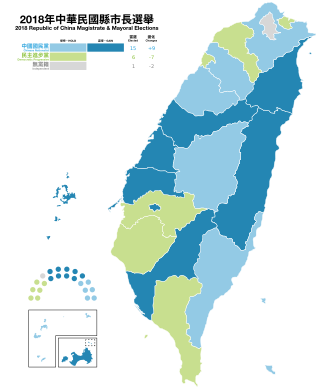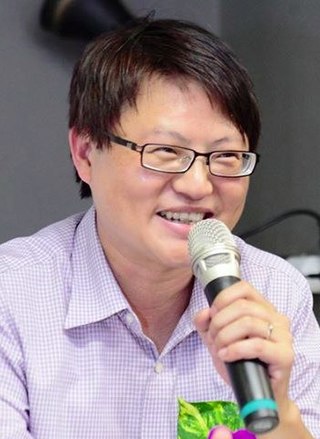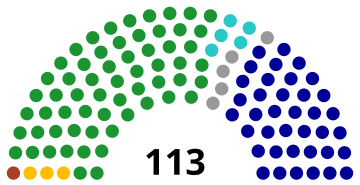
The Democratic Progressive Party (DPP) is a centre to centre-left Taiwanese nationalist political party in Taiwan. As the dominant party in the Pan-Green Coalition, one of the two main political camps in Taiwan, the DPP is currently the ruling party in Taiwan, leading a minority government that controls the presidency and the central government.

The Legislative Yuan is the unicameral legislature of the Republic of China (Taiwan) located in Taipei. The Legislative Yuan is composed of 113 members, who are directly elected for four-year terms by people of the Taiwan Area through a parallel voting system.
In Taiwan, parliamentary elections are held every four years to elect the 113 members of the Legislative Yuan, the unicameral legislature of Taiwan. The current electoral system was introduced in 2008. The constitutional amendments of 2005 extended term length from three to four years, reduced seat count from 225 to 113, and abolished the National Assembly, originally another governmental organ equivalent to a chamber of parliament.
Nation-wide general and local elections are held every four years, typically in January and November. By-elections and referendums are held on occasion. Electoral systems include first-past-the-post, proportional representation, single non-transferable voting, and a parallel mixture of the above.

Legislative elections were held in Taiwan on 12 January 2008 to elect the members of the Legislative Yuan. It was the first Legislative Yuan election after the constitutional amendments of 2005, which extended term length from three to four years, reduced seat count from 225 to 113, and introduced the current electoral system.

Presidential elections were held in Taiwan on 14 January 2012. The election was held concurrently with legislative elections. It was the fifth direct election for the President of the Republic of China. Prior to 1996, the President was elected by the ROC's National Assembly and not directly by the people.

Su Jia-chyuan is a Taiwanese politician of the Democratic Progressive Party (DPP).
General elections were held in Taiwan, officially the Republic of China, on Saturday, 16 January 2016 to elect the 14th President and Vice President of the Republic of China, and all 113 members of the ninth Legislative Yuan:

Presidential elections were held in Taiwan on 16 January 2016. Democratic Progressive Party (DPP) candidate Tsai Ing-wen with her independent running mate Chen Chien-jen won over Eric Chu of the Kuomintang (KMT) and James Soong of the People First Party (PFP). Tsai became the first female president in Taiwan, as well as in the Chinese-speaking world.

Legislative elections were held in Taiwan on 16 January 2016 to elect all 113 members in the Legislative Yuan, alongside presidential elections. The Democratic Progressive Party (DPP) led by Tsai Ing-wen, who also won the presidential election on the same day, secured a majority for the first time in history by winning 68 seats. The ruling Kuomintang (KMT) lost both the presidency and its legislative majority and returned to the opposition.

Chang Hung-lu is a Taiwanese politician. A member of the Democratic Progressive Party (DPP), he currently serves as a member of the Legislative Yuan.
The 2020 Taiwanese general election was held on 11 January 2020 to elect the 15th President and Vice President of Taiwan, and all 113 members of the 10th Legislative Yuan.

Local elections were held on 24 November 2018 in Taiwan, to elect county magistrates, county (city) councilors, township mayors, township councilors and chiefs of village (borough) in 6 municipalities and 16 counties (cities). Elected officials would serve a four-year term. Polling stations were open from 08:00 to 16:00 on the election day.
By-elections for the Ninth Legislative Yuan were held in 2019, two on 27 January and four on 16 March, at Taiwan to elect 6 of the 113 members of the Legislative Yuan for the remaining term until 2020.
Taichung City electoral constituencies consist of 8 single-member constituencies, each represented by a member of the Republic of China Legislative Yuan.

The Taiwan People's Party (TPP) is a centre-left political party in Taiwan. It was formally established on 6 August 2019 by Ko Wen-je, who serves as its first and current chairman. The party considers itself as an alternative third party to both the Democratic Progressive Party and Kuomintang.
The Legislative Yuan is the unicameral legislature of the Republic of China (Taiwan), currently with 113 seats, down from the previous 225 in 1998.

The Taiwan Statebuilding Party is a political party in the Republic of China (Taiwan). The party was established in 2016 as Taiwan Radical Wings. The party is considered a rather close ally of the Democratic Progressive Party, while fighting to replace opposition parties whom TSP unilaterally claims as "not loyal to Taiwan", such as Kuomintang and Taiwan People's Party. In the 2024 Taiwanese legislative election, TSP failed to gain any seat in the Legislative Yuan and lost its status as a national political party.
A by-election was held on 9 January 2022 in Taichung to elect one member of the Legislative Yuan for the Taichung City Constituency II for the remaining term until 2024. Democratic Progressive Party legislator Lin Ching-yi won the by-election for Taichung 2 to replace Chen Po-wei, who was recalled on 23 October 2021.

Legislative elections were held in Taiwan on 13 January 2024 to elect members of the Legislative Yuan. The elections were held alongside presidential elections.




















